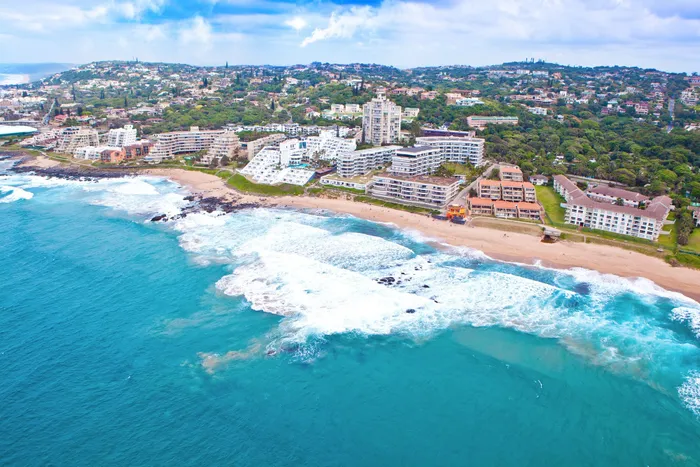
With uMhlanga and Ballito becoming premier luxury living destinations for high-net-worth individuals, they are helping attract investment to the KwaZulu-Natal province.
Image: Supplied
KwaZulu-Natal is experiencing green shoots in its property sector, which is pulling investors to the country’s second-largest economic contributor.
The High Street Auction Co is now targeting the region for growth during the second half of this year, says Greg Dart, the director of the property auction house.
“We've got a huge pool of Gauteng investors looking to redeploy capital out of this region. While many local competitors in the auction space are reticulating existing money in the province, High Street has an investment pool that will inject new capital into the region.
"Investors with whom we have built strong relationships over the past 15 years trust our platform and ability to find the right investment opportunities. People are looking to diversify and trade into new regions. KZN is certainly attracting a lot of interest,” Dart explains.
Dart says High Street is already negotiating the sales of several iconic properties in the province, starting with three in the upcoming auction at the Bryanston Country Club in Johannesburg on September 25.
These include High Rocks in Umkomaas.
Dart says that the upswing in the Mid-South Coast, led by developments such as JSE-listed Crookes Brothers’ Renishaw Hills, Serenity Hills and Umdoni Point estates, together with plans to build small craft harbours at both Scottburgh and Hibberdene, is just the beginning of a far larger property awakening along the South Coast which is home to the majority of the country’s blue flag beaches.
He added that the North Coast, which has driven rapid economic development in the region for over two decades on the back of the opening of the King Shaka Airport and surrounding Dube TradePort and aerotropolis, as well as key logistics and warehousing nodes such as Riverhorse Valley and Cornubia, is also a priority for High Street.
This is because of its proximity to the airport and South Africa’s busiest and largest container port, thereby making this a strategic investment hub.
The large Stanger property is said to be suited to warehousing, light manufacturing or logistics that is due to come under the High Street hammer on September 25 is likely to be the first of many.
The KZN North Coast has also seen residential and tourism-based development with the soon-to-open Club Med development by Umhlanga-based Collins Residential, together with the evolution of the Sibaya Coastal Precinct and Zimbali Lakes Development, creating a great deal of anticipation.
“The Club Med development and other residential and mixed-use developments in the area will change the North Coast forever,” says Chris du Toit, the project lead for the Club Med South Africa development.
“We are really excited about where the tourism market is heading and anticipate significant secondary market developments in all the nearby precincts. The influx of international guests will create very strong market dynamics for the region.”
This KZN Coast is said to be known for attracting high net worth individuals, many of whom have settled their families in premier estates that are close to upmarket schools while they commute to and from Gauteng weekly.
This work-to-travel market also presents a potentially lucrative pool of investors, says Dart: “Durban is an hour away. You do your business in Joburg, but your family and lifestyle are in KZN. We are finding that because the family has established itself there, those with capital are looking to invest in the region too.”
The Upper Highway area, which includes key logistics hubs such as Westmead and Hammarsdale along the main N3 route to Gauteng, which is in the throes of a multi-billion-rand upgrade, is another noteworthy investment node.
The R15-billion Westown Development taking shape in Durban’s Outer West is said to promise not only residential but also retail and logistics space.
The greater Westown Precinct is moving ahead rapidly, says Carlos Correia, CEO of Fundamentum Property Group, which is driving this development.
“Westown focuses on the value of open space and is designed to integrate with existing outdoor and lifestyle activities that define the Shongweni/Hillcrest sub-region, such as horse riding, trail running, mountain biking, walking, birding and much more.
"With a primary catchment area stretching from Westville to Cato Ridge, just off the N3 highway, Westown is attractive due to its location and ease of access.”
Neighbouring developments include the Baldwin’s Classic Collection (with earthworks having commenced for the first 200 units of Shongweni Eco-Park), the 100-bed West Private Hospital, Parc Ferme, a motor-focused new commercial scheme and the Farrier Business Park, which will focus on logistics and warehousing.
“We've sold a lot of properties in KZN in the past. In light of this, we certainly want to formalise our presence more aggressively here. Already, we are doing a lot of work to get more exposure. We believe that this is a region that should not be neglected in anybody's investment planning,” Dart says.
Earlier this month, KZN Premier Thami Ntuli acknowledged that the province faced a series of severe disruptions in recent years, including devastating floods, the Covid-19 pandemic, energy insecurity, and logistics bottlenecks. Looting and crime further eroded investor trust, placing immense pressure on communities and businesses.
Despite these challenges, Ntuli said KZN has demonstrated remarkable resilience and innovation. "That resilience is now being transformed into a comprehensive recovery blueprint under the banner “KwaZulu-Natal Reimagined”, an initiative focused on driving inclusive growth, building new value chains, and restoring confidence among investors and citizens alike."
He has since unveiled a bold Provincial Jobs and Economic Growth Action Plan projected to have an economic impact of R56 billion.
Independent Media Property
Related Topics: